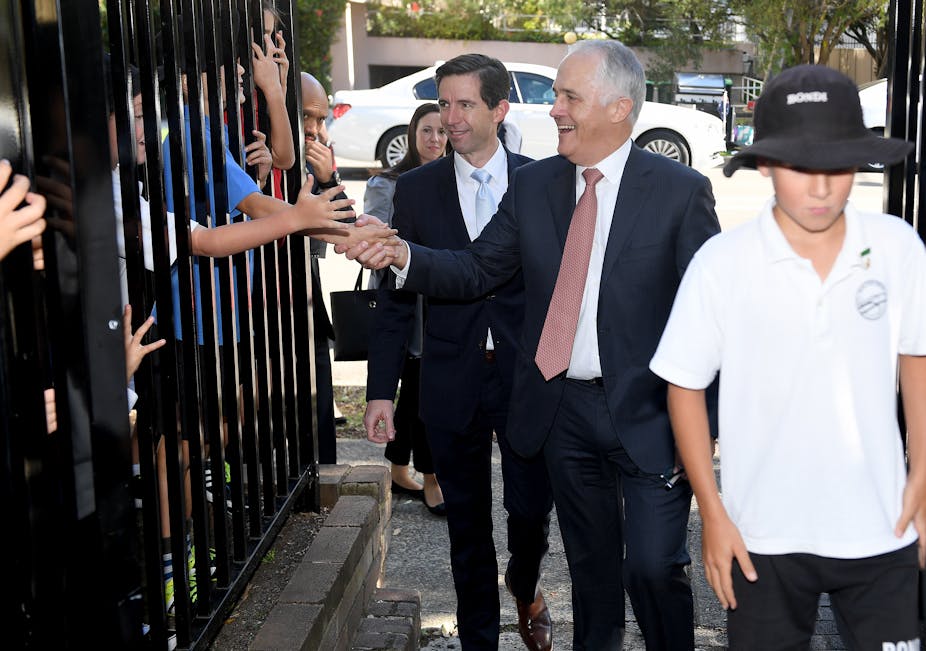Struggling to land a deal on schools funding with either the Greens or other crossbenchers, Education Minister Simon Birmingham is now also having to hose down a backbench backlash over the treatment of Catholic schools.
Critics are expected to speak out in the partyroom on Tuesday, demanding more information about the effects of the package on the Catholic sector.
Western Australian Liberal Chris Back, who retires from the Senate at the end of this week, on Monday threatened to cross the floor unless he is convinced the changes would not disadvantage these schools. Back is a former member of the Catholic Education Commission in WA.
Victorian Liberal Kevin Andrews said backbenchers had not been given departmental modelling provided to the crossbench – which was leaked to Fairfax Media – showing that over a decade Catholic schools would be A$4.6 billion worse off compared with present arrangements, while government schools would be $4 billion better off.
While the Catholic sector’s funding will grow under the package, it will suffer in relative terms because it will no longer benefit from special deals done by previous governments.
Andrews is also critical of the government seeking to do a deal with the Greens.
There has been a campaign from the Catholic sector since the package was released, although the sector has not been united, with the strongest opposition in Victoria and the ACT.
Tony Abbott has previously expressed concern about the deal for Catholic schools. Abbott and other Liberals in seats around Sydney’s North Shore are under concerted pressure from the Broken Bay diocese.
Jason Falinski, who holds the seat of Mackellar, said the Broken Bay diocese was worried about whether the Catholic sector would have sufficient autonomy over the funding it received. He was not sure of the basis of the fears, given ministerial assurances.
But “if there are any unintended consequences we need to have them brought forward and we’ll work with the minister to eliminate them”, Falinski said. “I am a product of the Catholic system – I wouldn’t want anything bad to happen to that system.”
The government’s original package would deliver $18.6 billion in extra funding over ten years and bring the funding system onto a more needs basis. It is now offering substantial concessions to get Senate support, compressing the timeframe and adding money.
Support from ten Senate crossbenchers is needed to pass the package. If a deal were done with the nine Greens, the government would have no trouble getting one more vote. If it cannot get the Greens’ support, it requires ten out of the other 12 crossbenchers. The numbers would become more difficult if Back crossed the floor, but not if he simply abstained.
Birmingham said he was “confident that we will have support within the government’s ranks to deliver the needs-based funding that Australian schools deserve, to deliver consistency into the future, across school systems”.
He described Back’s objections as “some small technical issues” about if and when the funding model calculations might be reviewed. He met Back on Monday.
As a Senate vote approaches, the last-minute lobbying has intensified. The Australian Education Union is trying to shore up opposition to the legislation within a divided Greens.
The National Catholic Education Commission ran a full-page advertisement in The Australian claiming: “Changes to the way schools are funded mean over 260,000 Catholic schoolkids could have their funding cut”. And representatives from the Broken Bay diocese were in Canberra seeing MPs.
POSTSCRIPT
The Australian Council of State School Organisations (ACSSO) has urged passage of the schools legislation “with some sensible amendments”.
ACSSO, which says it represents “the interests of the families and communities of more than 2.4 million children attending government schools in Australia”, on Monday night distributed an open letter to crossbench senators.
It warns: “If the bill, complete with its amendments, does not pass we face the prospect of years of an education funding war of attrition where the only losers will be the children and families of public schools.”
The ACSSO stand contrasts sharply with that of the Australian Education Union (AEU), representing teachers in government schools, which is fighting to stop the legislation being passed.
The ACSSO letter, in the name of the organisation’s president Phillip Spratt, says the “special deals” of the present system have to end. “Funding has to go to where it can have the greatest impact”.
It says the government “has taken up the challenge of proposing an end to the special deals and unfair advantages in the existing legislation and offered a single model that, whilst not perfect, offers significant potential to level the current distribution, accountability and transparency of funding across all sectors and systems”.

